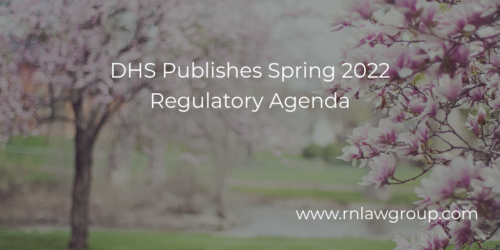
DHS Publishes Spring 2022 Regulatory Agenda
The Biden Administration’s Spring 2022 Regulatory Agenda has been recently published and is now available. All of the items on the DHS regulatory agenda can be found here: https://www.reginfo.gov/public/do/eAgendaMain?operation=OPERATION_GET_AGENCY_RULE_LIST¤tPub=true&agencyCode=&showStage=active&agencyCd=1600&csrf_token=3D0D6305C7ADCE3B1A3C5426CD5F9038A2CD5E41696D6E18CC951E258F74666CF756F298866E01104014356F7A434C449194 (last visited June 27, 2022).
Please keep in mind, as we have seen in the past, these are agenda items. There is no guarantee they get acted on, and certainly not a timeline we can predict at this moment. While at this time we do not have full details of the possible regulatory actions, we at least are aware of what DHS has put on the agenda. In this article, we will provide the abstract DHS has provided as well as some brief commentary on some of the items that may potentially impact employment based immigration.
- RIN 1615-AC22: “Updated Adjustment of Status Procedures for More Efficient Processing and Immigrant Visa Usage”:
The Department of Homeland Security (DHS) proposes to amend its regulations in order to improve the efficiency in the processing of the Application to Register Permanent Residence or Adjust Status (Form I-485), reduce processing times, improve the quality of inventory data provided to partner agencies, reduce the potential for visa retrogression, and promote the efficient use of immediately available immigrant visas to include the expansion of concurrent filing to the employment-based 4th preference (certain special immigrants) category, including religious workers.
https://www.reginfo.gov/public/do/eAgendaViewRule?pubId=202204&RIN=1615-AC22 (last visited June 27, 2022).
Commentary: It is no secret that adjustment of status processing is much longer than the 96 minutes USCIS stated it takes to adjudicate in the November 2019 fee regulation. There are aspects of the I-485 that are potentially unnecessary and hopefully this regulation comes forward quickly to streamline the process of adjudication.
2. RIN 1615-AC68: “U.S. Citizenship and Immigration Service Fee Schedule”
DHS will propose to adjust the fees charged by U.S. Citizenship and Immigration Services (USCIS) for immigration and naturalization benefit requests. On August 3, 2020, DHS adjusted the fees USCIS charges for immigration and naturalization benefit requests, imposed new fees, revised certain fee waiver and exemption policies, and changed certain application requirements via the rule “USCIS Fee Schedule & Changes to Certain Other Immigration Benefit Request Requirements.” DHS has been preliminarily enjoined from implementing that rule by court order. This rule would rescind and replace the changes made by the August 3, 2020, rule and establish new USCIS fees to recover USCIS operating costs.
https://www.reginfo.gov/public/do/eAgendaViewRule?pubId=202204&RIN=1615-AC68 (last visited June 27, 2022).
Commentary: In 2019, USCIS attempted to raise fees on most visa classifications. This was ultimately shot down by multiple federal courts for issues regarding interim DHS officials. Since then, DHS has made it clear they want to update USCIS’ fee structure, and appears to be working to do so once this is published
3. RIN 1615-AC70 “Modernizing H-1B Requirements and Oversight and Providing Flexibility in the F-1 Program”
The Department of Homeland Security (DHS) is proposing to amend its regulations governing H-1B specialty occupation workers and F-1 students who are the beneficiaries of timely filed H-1B cap-subject petitions. Specifically, DHS proposes to revise the regulations relating to “employer-employee relationship” and provide flexibility for start-up entrepreneurs; implement new requirements and guidelines for site visits including in connection with petitions filed by H-1B dependent employers whose basic business information cannot be validated through commercially available data; provide flexibility on the employment start date listed on the petition (in limited circumstances); address “cap-gap” issues; bolster the H-1B registration process to reduce the possibility of misuse and fraud in the H-1B registration system; and clarify the requirement that an amended or new petition be filed where there are material changes, including by streamlining notification requirements relating to certain worksite changes, among other provisions.
https://www.reginfo.gov/public/do/eAgendaViewRule?pubId=202204&RIN=1615-AC70 (last visited June 27, 2022).
Commentary: Since losing in court on multiple H-1B issues, USCIS has indicated they want to revamp the H-1B and F-1 program. This would likely be the vehicle they use to get there. We will see how this regulation comes out, but remember, USCIS has to stay within the limits of the Immigration and Nationality Act within any of its reforms. This has been something USCIS has attempted before, but has not been successful in passing.
4. RIN 1615-AC78: “Temporary Increase of the Automatic Extension Period of Employment Authorization and Documentation for Certain Renewal Applicants”
This rule temporarily amends existing Department of Homeland Security (DHS) regulations to provide that the automatic extension period applicable to expiring Employment Authorization Documents (Forms I-766 or EADs) for certain renewal applicants who have filed Form I-765, Application for Employment Authorization, will be increased from up to 180 days to up to 540 days from the expiration date stated on their EADs. This increase will be available to certain eligible renewal applicants with pending Forms I-765 for a temporary period lasting 540 days.
https://www.reginfo.gov/public/do/eAgendaViewRule?pubId=202204&RIN=1615-AC78 (last accessed June 27, 2022)
Commentary: This rule is already in action as a Final Rule. However, the notice and comment period for this rule ends July 5, 2022. USCIS can potentially adopt some of the comments to make changes to what is already being enacted. We do not foresee a limitation on what is already being provided.
5. RIN 1653-AA86: “Optional Alternative to the Physical Examination Associated With Employment Eligibility Verification (Form I-9)
DHS proposes to revise employment eligibility verification regulations to allow the Secretary to authorize alternative document examination procedures in certain circumstances or with respect to certain employers. Future exercises of such authority may reduce burdens on employers and employees while maintaining the integrity of the employment verification process. This rule is consistent with Executive Order 14058, which directs agencies to take actions that improve service delivery and customer
experience by decreasing administrative burdens, enhancing transparency, and improving the efficiency and effectiveness of government.
Commentary: This is a proposed rule from ICE that could potentially make it easier to conduct I-9 verification. During COVID-19, ICE has allowed for various I-9 flexibilities, the physical presence requirement flexibility is set to end October 31. See https://www.rnlawgroup.com/important-i-9-updates-effective-may-1st-that-employers-should-be-aware-of/. It is possible that this proposed rule allows ICE to create regulations to enact these flexibilities on a more permanent basis.
Again, most of these do not have solid timelines just yet. Our firm will provide updates as we receive them. Should you have any questions, contact a qualified immigration attorney for more information.
By: Steven Brown
Steven Brown is a Partner at Reddy Neumann Brown PC where he works in the Non-immigrant visa department and leads the Litigation Team. His practice covers all phases of the non-immigration visa process including filing H-1B, L-1, E-3, H-4, and H-4 EAD petitions. In the last two years, Steven has successfully handled over 1,000 non-immigrant visa petitions including filing petitions, responding to any necessary Requests for Evidence, and drafting motions and appeals. He has also become a key resource for F-1 students that seek guidance on properly complying with the F-1 visa regulations and any OPT or CPT issues they may have. Additionally, Steven holds a weekly conference call for companies that are part of one of the largest organizations for IT Services companies in America.

